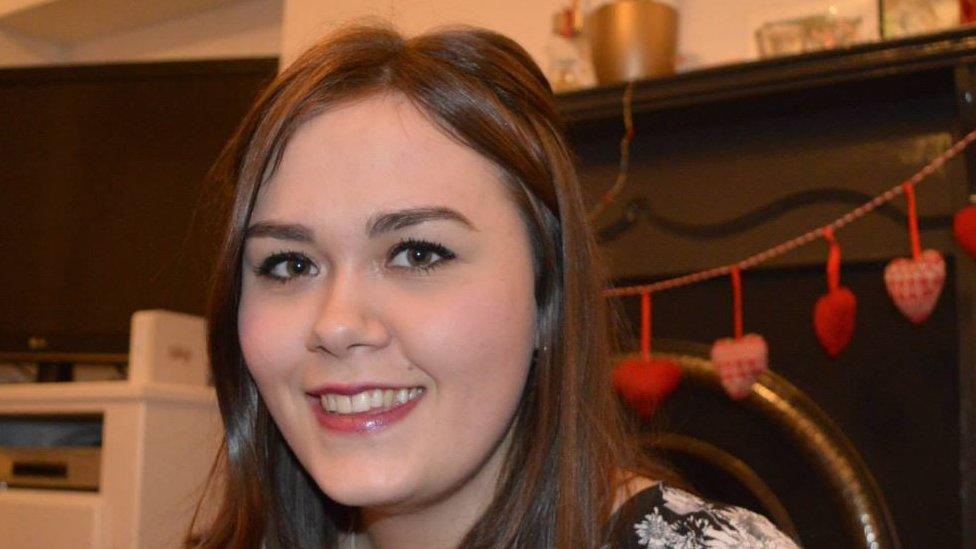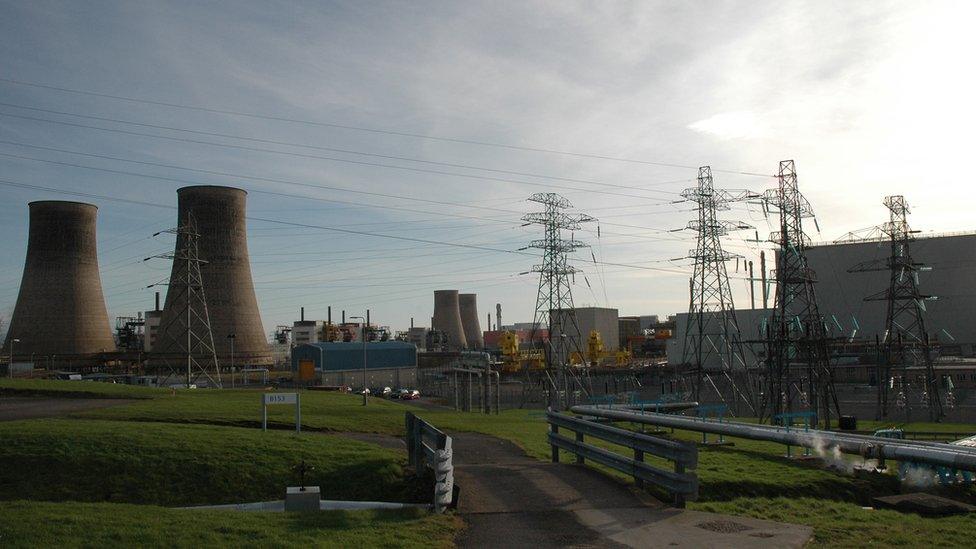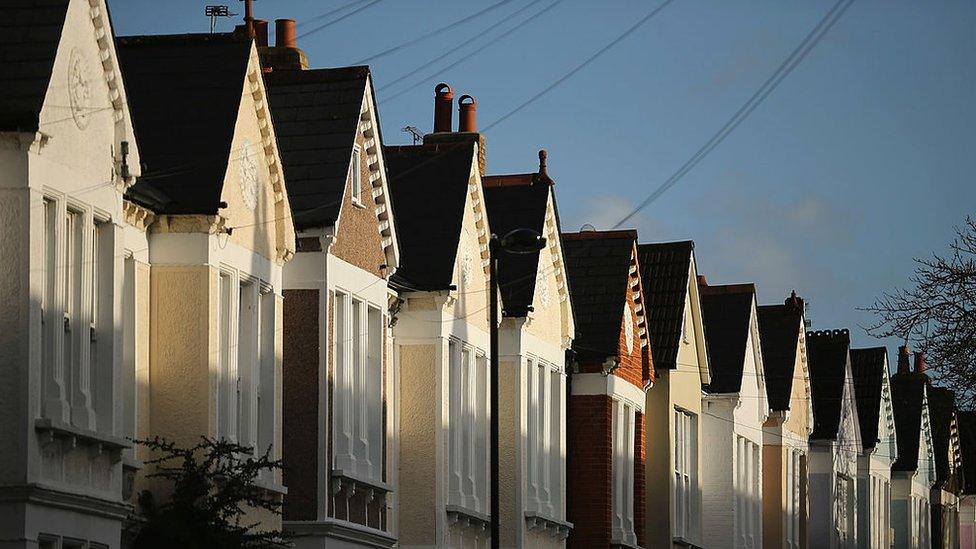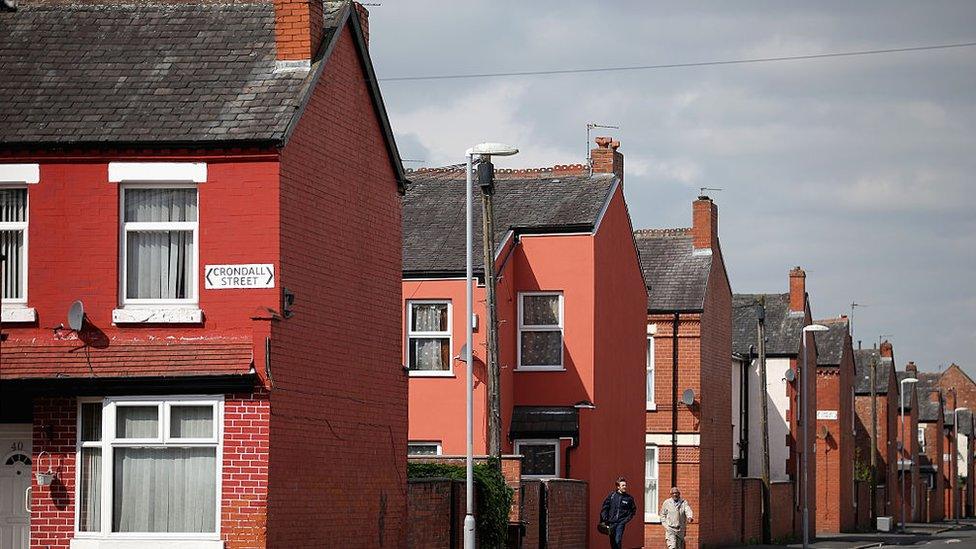'Sky-high' rental hotspots across England revealed
- Published
Where is it most expensive to rent a home?
People spend more than a third of their disposable income on rent across large parts of England, a BBC investigation has found.
Analysis shows the average rent of a one-bedroom property in almost half of all districts, boroughs and cities would cost more than 30% of the median take-home salary for the area.
The problem is most acute in London and the South East.
The government said it was committed to building more affordable homes.
BBC England's data unit analysed the average rents for different types of property in each local authority area and the median weekly wage for those areas, using figures published by the Office for National Statistics.
According to Shelter and the Joseph Rowntree Foundation, spending more than a third of your disposable income on rent or a mortgage means you may not be able to afford other basic needs.
How affordable is rent in your area?
Based on average rents and median weekly wages, our investigation found:
Renting a studio flat exceeds 30% of take-home pay in every London borough except Bexley. The cost of a studio exceeds £1,000 a month in Camden, Hackney, Islington, Kensington and Chelsea, Southwark, Tower Hamlets and Westminster
Renting a room in a house or flat would swallow up more than 30% of the average disposable income in 15 of London's 32 boroughs
It is impossible to rent a one, two or three bed property within the recommended limits across the whole of the capital. In 24 London boroughs and the City of London, a one-bedroom property would consume more than half your disposable income
The average cost of renting a room in a flat or a house in London is £607 a month, compared to £424 across the South East
The most expensive places to rent a room in the South East are large parts of Surrey, Oxfordshire and Tunbridge Wells in Kent
Renting a one bedroom property in the South East would be impossible within recommended limits everywhere except Medway, Hastings, Rother, Gosport, Dover, Shepway, Thanet and the Isle of Wight
Dan Wilson Craw, a policy manager at Generation Rent, which campaigns for affordable housing, said: "Across London and the South East, the only option for average earners is to squeeze themselves into ever more crowded flat shares.
"This might work for some, but it's a completely unsustainable situation for anyone who wants to settle down. Unless rents start coming down, the capital and its hinterland will start losing workers and that will weaken the national economy."

'I would like to get on the housing ladder'

Kerry Taylor works as a teaching assistant in a special school in Stratford, earning about £350 a week in take-home pay.
She pays £825 a month to rent a room in a shared house in Lambeth, south London, where she has her own bathroom and kitchen.
She said: "I would like to get on the housing ladder but I have resigned myself to the fact that working in social care isn't going to get you the right salary, let alone give you the chance to save up for anything.
"I would love to own a home so that no one can kick me out, as I now have to leave my house as the landlady wants to sell.
"I've lived in Manchester, Edinburgh and my home town in Yorkshire but I've never been happier and more comfortable than in London. This is really important to me and I have created a great network of friends so the idea of moving and starting again somewhere else, as I've done twice before, is too exhausting to think about.
"I hope it doesn't come to having to leave but I suppose I can't rule it out completely if it gets that desperate."
'I'm going to live on a boat'

Freelance musician and composer Matt Winkworth has been renting houses around Oxford for 10 years, but to gain security he has decided to buy a narrow boat, which he intends to live in.
The 31-year-old said: "Buying a boat is something that I've been thinking about doing for a long time.
"I've thought about getting a mortgage, but I would have to move out of the area that I work [in], it's impossible to buy anywhere in the South East.
"[Living in the boat] will be the first time I have lived on my own."
'I've been priced out of Oxford'

Sophie Mogridge moved to Oxford last year and lives in a three-bedroom house with two friends.
The trainee teacher has resigned herself to the fact that she can no longer live in the city, which is considered the most unaffordable place to live in Britain.
She spends £515 a month on rent but, when bills are taken into account, she spends half her £18,000-a-year income on accommodation.
The 23-year-old said: "My rent is incredibly high but my salary isn't as high.
"That means I'm not able to do all the social things that all my friends [outside of Oxford] can do.
"I'm actually moving to Banbury so I can afford to enjoy life."


North-South divide
Our figures showed 142 out of 324 areas where the average rent for a one bedroom property was higher than 30% of take-home wage. None were in the north of the country except Manchester, Salford and York.
Renting a room in a house across the North West and North East falls within 30% of take-home pay everywhere except Halton in Cheshire (£520). The cheapest place to rent a room was Hyndburn in Lancashire (£271). In Chorlton in Greater Manchester, a small one bedroom apartment , externalhas gone on the market for £395 a month
Renting a one-bedroom property across the North falls within recommended limits everywhere except Salford, Trafford and Manchester city centre
Someone earning the average wage in Copeland on the north-west coast would effectively have the most left over between their take-home pay and the recommended 30% limit on renting a one-bedroom home
Renting a room falls within recommended limits across the whole of the East and West Midlands
But the rental cost of a one-bedroom property exceeds 30% of disposable income in Nottingham, Northampton, Warwickshire, Stratford upon Avon, Redditch, Warwick and Birmingham

Analysis - The most affordable place to live?

Copeland in Cumbria seems to have that magic mix of cheap rents and high wages.
However, the data does not tell the full story. Copeland is home to the Sellafield nuclear fuel reprocessing and nuclear decommissioning site. There are also proposals for a new nuclear power station, the Moorside project, to the north of the current Sellafield site. The energy industry in Copeland also includes the Walney Wind Farm offshore.
Lynne Atkinson, of Cumbrian lettings agency Grisdales, said: "Nuclear power does skew the figures when it comes to wages as there are some very well-paid jobs in the area.
"It is good value for money renting in Copeland and the market is very strong. It is cheaper than other areas in the North West, such as the Lakes. There has also been a lot of buy to let investment."

Campbell Robb, chief executive of Shelter, said: "Our chronic housing shortage means private renting is no longer a stepping stone for people starting out in life - it's where a quarter of families have to live.
"And with sky high rents eating up a huge chunk of people's monthly income, it's sadly no surprise that at Shelter we're hearing from growing numbers of families who are struggling just to cover the cost of the basics, and keep a roof over their heads."
Explore the full dataset here, external
Henry Gregg, assistant director of communications and campaigns at the National Housing Federation said: "These figures provide yet more evidence of how seriously unaffordable renting is in this country. Sky-high rents mean unstable and uncertain living situations are becoming the norm."
Our investigation used the median average, which describes the middle value in a set.
The median monthly take home pay in England is about £1,833, after tax and national insurance contributions.
That means rent should take up no more than £550. The England average price of a room in a house is £382, while a one-bedroom property costs £694.
Alan Ward, who chairs the Residential Landlords Association said there was a rental "supply crisis" because the government had focussed on home ownership.
According to a survey carried out by the association, 84% of landlords were considering raising rent due to "punitive tax changes by the government".
A Department of Communities and Local Government spokesman said: "More than 300,000 people have been helped in homeownership through government-backed schemes since 2010, while almost 900,000 more homes have been delivered since the end of 2009.
"But we know there is more to do. That's why we've doubled the housing budget, including investing £8bn in an extra 400,000 quality affordable homes to rent and buy.
"We're also extending shared ownership, giving more people the chance to buy a home with a deposit of as little as £1,500."
Reporting team: Peter Sherlock, Daniel Wainwright, Paul Bradshaw, Steven Connor
- Published20 June 2016

- Published9 July 2020

- Published2 August 2016
